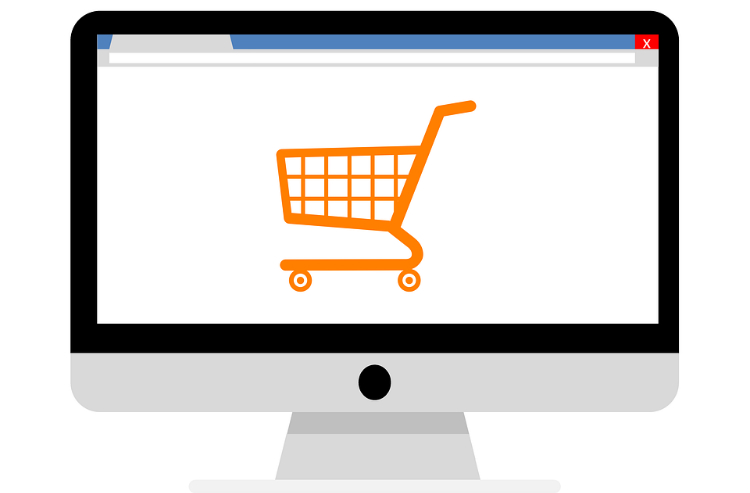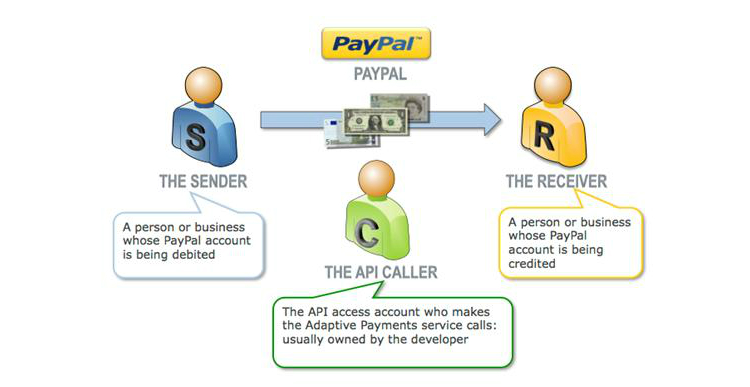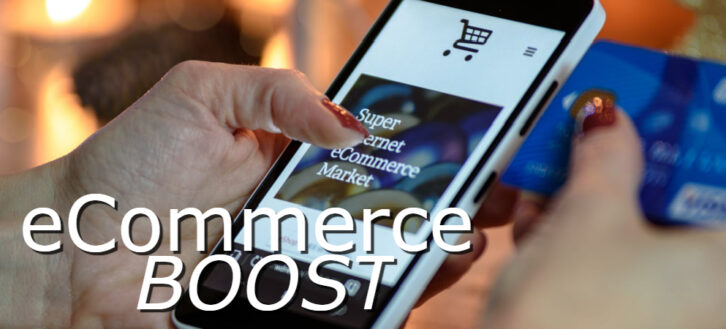E-commerce is defined as the buying and selling of goods or services via the internet. More importantly, it uses the transfer of money and data to execute these transactions. E-commerce is often used to refer to the sale of physical products online, but it can also describe any kind of commercial transaction that is facilitated through the internet.
As the number of people who buy goods and/or services online increase, it is crucial for businesses to take their e-commerce efforts very seriously. According to the company Oberlo, there are projected to be 1.92 billion global digital buyers in the year 2019. This equates to roughly 25% of the world’s population. Furthermore, 13.7% of all retail sales worldwide are projected to come from e-commerce in 2019. Based on these statistics, it is easy to understand the importance of e-commerce in today’s business world.

Even though there are statistics to prove the importance of e-commerce, the reality is that many businesses still do not value it at all. According to a recent survey conducted by SurePayroll, 74% of small businesses do not have an e-commerce-based website. Since 99.9% of all businesses in the United States are considered to be small businesses, this means that an overwhelming majority of business owners do not value e-commerce as much as the data suggests that they should.
Based on all of these statistics above, it is clear that boosting your e-commerce sales will greatly benefit a business. However, doing so can be challenging. If you are a business owner looking to increase your e-commerce sales but are having trouble doing so, you found the right post. In this article, we will be discussing five strategies that you can use in order to boost your business’s e-commerce sales.
Provide Evidence That Your Website Is Secure
Making sure that your website is secure is the first and most important thing you should do if you want to increase your e-commerce sales. However, making sure that it is secure is not enough; You also need to provide evidence that the site is secure. If you do not, you could be negatively impacting your e-commerce sales. Even if your website is truly secured, consumers are still not going to want to shop on it if they feel that it is sketchy, untrustworthy, or not secured. That is why providing evidence that your website is secured is so important.

There are two ways in which you can provide consumers evidence that your website is safe. You can display a “secure” sign at the beginning of your sites URL, and you can display any security badges your website is using on the bottom of the page. Doing both of these things provides sufficient evidence to anyone who visits your website that any personal information that they enter into your website will be safe.
Choosing A Security System
Now that you understand the importance of having security, and proving it to your consumers, the next step is deciding on which security system to use. There are many different security companies that you can choose from, such as Google TS and TRUSTe, but the best one to choose in this particular instance is Norton Antivirus. The reason why Norton Antivirus is recommended the most is because of its reputability with consumers. In March of 2016, 1,000 consumers were asked, “Which badge of security on a webpage gives you the best sense of trust when paying online?”; Over 40% of them said Norton Antivirus.
Even though Norton Antivirus may not be the most effective software system to use, the fact that consumers trust it the most means that you should be using it. If you decide that Norton Antivirus is not the most effective program for your particular webpage, you can add another security system to provide additional safety. This is because there is not a limit to the amount of security systems you can have implemented on a webpage. As long as you take the necessary steps to provide evidence that your website is secure and trustworthy, you will start to see your e-commerce sales increase in no time.
Target Existing Customers
A common misconception that many business owners have is that in order to grow their business and increase their sales, they need to focus on acquiring new customers. Although customer acquisition is important for every business, customer retention has been proven to be a more effective way to increase sales and grow a business. This is because existing customers add more items to their shopping carts, have a higher conversion rate, and generate more revenue each time they visit your site than a new customer would. In addition to the benefits, it is much more cost-effective to target already existing customers than it is to try and acquire new ones.

There are many different ways in which you can target your existing customers efficiently, but the best way to do so is by improving their overall experience with your brand. For example, coming up with a customer loyalty program that gives people an incentive to spend more money each time they shop on your webpage is a great way to improve your customers’ experience with your brand. For these reasons, targeting your existing customers is an excellent way in which you can boost your e-commerce sales.
Include APIs on Your Website
Application programming interfaces (APIs) are a set of tools, definitions, and protocols for building and integrating application software. APIs let your product or service communicate with other products and services without having to know how they’re implemented. Once your software application is able to interact with other software applications, you are then able to streamline your business processes and communicate with vendors. Often times, these vendors provide services that your business may need. For example, if a user is on your website and wants to purchase an item using PayPal or any other third party paying application, APIs are what makes this possible. An API makes this possible by connecting your website’s software applications to the third party vendor’s software applications. This connection allows consumers to pay for whatever they want and however they want with a simple click.

Additionally, APIs can help in the medical field as well. Let’s say you are a doctor and a patient wants to schedule an appointment with you and simultaneously put it on their own personal Google calendar. The patient can do this all with the simple click of a button thanks to the connection of software applications between your website and Google calendars. This connection of software applications is made possible through the use of APIs. By implementing APIs on your webpage, you are increasing your customer satisfaction and your customer engagement. The combination of these two benefits are what makes implementing APIs on your webpage an excellent strategy to use in order to boost e-commerce sales.
Optimize Your Business for Mobile
According to Statista, in the year 2019, 67.2% of all retail e-commerce sales worldwide will come from mobile. Furthermore, this number has increased every year since the first year this study was conducted in 2016. What this means is that more and more people are using their mobile devices to make online purchases as opposed to standard desktops, laptops, and tablets. Therefore, optimizing your business for mobile is something you must do if you want to boost your e-commerce sales. There are many different ways in which you can optimize your business for mobile, but there are two methods that have been proven to be more effective than the rest. The first method is to make sure that your website is mobile friendly, and the second method is to develop a mobile app.

Mobile Apps
Mobile apps are important for businesses to have because they boost customer loyalty, offer personalization, and have fast response times. In addition to these benefits, mobile apps are also preferred by customers. According to the web development company Ruby Garage, 78% of users would rather access a store via mobile app as opposed to a mobile site. Giving customers exactly what they want is always a good idea, and developing a mobile app does just that.
Mobile Websites
When it comes to mobile websites, it is crucial that you make sure it is mobile friendly. If your website is not mobile friendly, you could be missing out on a large amount of potential sales. In order to make your website mobile friendly, you need to make sure that its load time is fast, it’s easy to navigate, and that consumers can buy something easily on it. If your mobile site does not fit all of this criteria, then the likelihood of a consumer leaving your mobile site is extremely high. If a consumer leaves your mobile site, you miss out on a potential sale.
This is why optimizing your business for mobile by developing a mobile app, and making sure that your website is mobile friendly is something that you should do in order to boost your e-commerce sales.
Market Yourself on Social Media
Marketing your business on social media is an excellent strategy to use in order to boost your e-commerce sales. This is largely due to the amount of people who are active on social media. According to Statista, 2.77 billion people are expected to be active on social media in the year 2019, and this number is projected to increase every year for the foreseeable future. Because of how many people use social media, it only makes sense that the more you market your business on their platforms, the higher your e-commerce sales will be. When marketing your business on social media platforms, you want to make sure that you make it easy for whomever is reading your message to visit your website. The best way to do this is by including a link to your company’s website at the end of your post.

Aside from marketing your business on social media, you can also market specific products and/or services that you provide as well. For example, if you own a restaurant and are adding a new item to your menu, you can promote that specific item on your social media platforms. Just like when you are promoting your business, you also want to make it easy for customers to learn more about the product and/or service that you are promoting by providing a link at the end of your post.
Although marketing yourself on social media will help to increase your e-commerce sales, the chances that this strategy increases them by a considerable margin are very slim, unless you have a large social media following. This is why many small businesses turn to influencers for help. Influencers are people who already have a huge social media following. By getting influencers to promote your business on their social media accounts, you increase your brand visibility, and that could potentially lead to a boost in your e-commerce sales. There are many different influencers that you can choose from, and each of them have a different audience. Since each influencer has a different audience, it is important that you do your research before making a final decision. When deciding on which influencers to use, you should pick people that have an audience that is similar to yours. If you don’t, you could be wasting money by marketing yourself to people who are unlikely to engage with your business.

In addition to choosing an influencer that has a similar audience to yours, you also want to make sure that the influencer themselves share some similarities with your brand. For example, if you are in the food business, you do not want to work with an influencer who is famous for cars. In this case, it would make much more sense for you to work with an influencer who is a famous chef or food blogger. Having an influencer whose brand is similar to yours increases the likelihood of their followers being interested in your business as well. For these reasons, marketing yourself on social media is an excellent strategy to use if you want to boost your e-commerce sales.
In summary, approximately 25% of the world’s population is estimated to purchase a good or service online in the year 2019. Since so many people now make purchases online, it is critical that businesses find ways to boost their e-commerce sales. The ways in which you can boost your e-commerce sales are: providing evidence that your website is secure, targeting existing customers, using APIs on your website, optimizing your business for mobile, and marketing yourself on social media platforms. As long as you follow these five basic tips and make sure that you follow the advice in this article carefully, you are guaranteed to boost your e-commerce sales.

Nick Rojas is a business consultant and journalist who lives in Chicago and his hometown Los Angeles with his wife. His work often discusses social media, marketing, and branding in regards to small and medium enterprises (SMEs).



Nick Rojas, I read your blogs I was facing a little bit difficulties in my e-commerce business you have given great information which will help a lot of people who are running e-commerce business & thank you